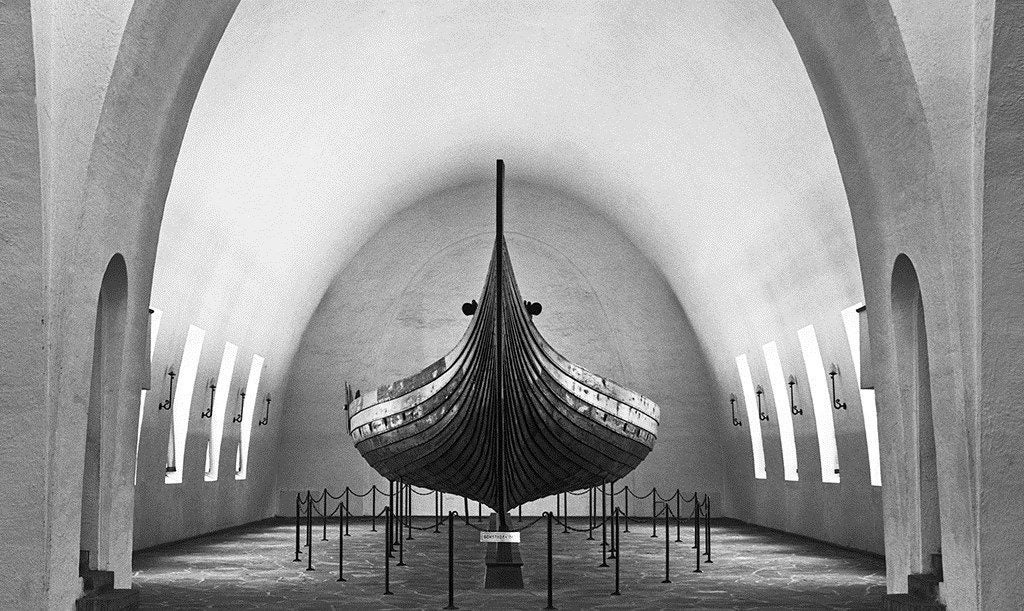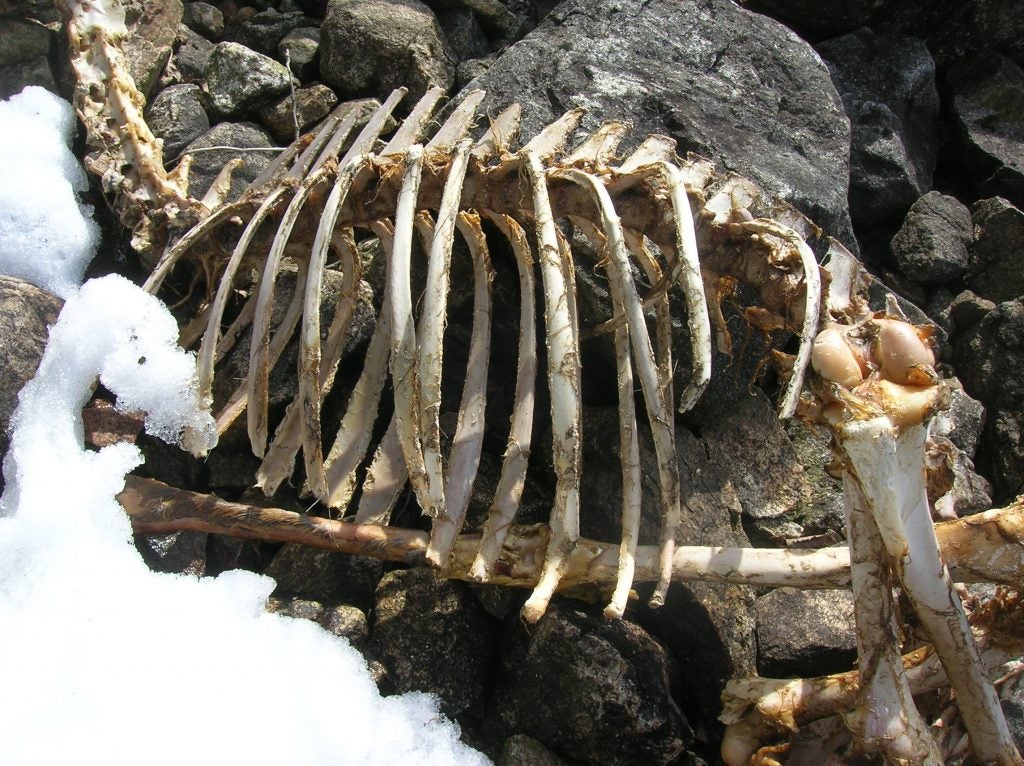Poetry by Paisley Rekdal from our Winter 2018 issue.
In Memoriam X, 1969–2016.
In this obituary your wife, now widow,
posts, I find a photo of you running a hand
along Gokstadt’s blackened bow,
mizzen snapped, the nail bolts sanded
down by time. The photo could have been my own:
the same milk light dousing this Oslo hall
we separately visited, each drawn here alone
by myths we’d studied once in school.
Now the ship’s grounded in perpetuity, hoisted
onto beetle-leg pylons. Night’s maw. King’s casket.
I study your face as you peer at a joist:
one plank jutting just out of concert, forever
a flaw, its weathered woods shellacked
and splayed, never to be smoothed back together.
Not odd, they’d said, just shy of your cousin.
All summer, he shadowed you, huge
in the cabin’s outhouse doorway where you
hunched, a child unable to escape his hands,
one cinderblock palm smothering your shouts–
After which you returned silent, wild-eyed
to your grandmother’s couch. You grew
to resemble him, your broad back straining
your t-shirts. How you hated your body
in the pictures you showed me, eyes screwed
tight against the sun, tiny beside your cousin
bearing down on you as he fumbled with a shoe,
your smiling grandparents, the Kobuk’s
black waters slapping a sun-bleached dock.
You never told. Vowels dissolved inside the walls
of other vowels: a labyrinth of sound
from which a boy would have to spool
out thread to escape. Pain’s underground
of sense: shadowy maze where all language
is inadequate. What could you have said?
And how, explaining, would you have enlivened
that scene and self you most hated, imagined
them again by the force of saying it aloud?
To thrust yourself back into those hands, the cousin
clawing at his belt, that almost-human screech
to the screen door slamming behind you at the cabin—
Where, above the tree line, bristling and stark,
an owl cries, quartering; hunting the dark.
Fear of sex made you fear me. That look
you shot, after the film where the actress shies,
asked if she mistrusts her lover. The shook
head, the lie only I caught in the tilt of her eyes.
“No,” she said—
It enraged you when I saw
what you didn’t, worried one night I’d turn
and insist you’d hurt me. My body with its small,
waiting betrayals you could not fathom,
my sex you saw as a trap, which I did not
despise in you, but pitied: the muscled weight
you shouldered into, that bulk you learned to carry
like your cousin, I said once, ignorant
of resemblance’s meaning, why so suddenly
you recoiled from me, flinching as if struck.
Once, fixing our car’s engine, the white hood slipped
and your shoulder took its brunt, hunched
to catch the metal’s glinting hinge, to stop
what would have snapped my wrist
in half, your quickness like that of a hawk
launched at a rattler’s coiling length.
The bruise I watched rise those days
along your shoulder blade: livid, a chalk-
yellow fringed with green like the rind
on a peach’s blooming pink. Then that meaty
purple, rich as plums: a damson stain wine-
dark and velvet I put my mouth to, to taste
your skin’s heat, your blood so close as to come
up throbbing through my tongue.
In dreams, someone calls me in the woods.
But when I turn it isn’t you, just the pocked
face of a stranger, shirt and breath gin-soured,
body a grunting weight that knocks
the flight right out of me, pins me to the ground
when I try to run, one rough touch rooting
me in place. My limbs grow numb, bark-sheathed
and pale under the grasping fingers, shoots
of hair twined to hawthorn lances
that cut his knuckles, blood sprays
of winter berries spangling my branches
that he quickly hews away. Something for me to keep,
he says, or whispers, my own voice hissed away
into the wind’s dull soughing of leaves.
And if I too had felt my head shoved
against shagged wood planks, scrubbed blood
from my thighs, or picked splinters
from my cheeks—? I could more than picture it,
my own violation making pain the place
our bodies would finally meet.
The soft give of my breasts,
my rounded belly: these I offered up as gifts
to you, as if such frailty was what we shared.
And when this failed to move you, whether
out of disgust or fear, I hardened myself to pure
muscle, starved away each craving till I pared
my way to a sleek essential: like you,
thin-hipped, raw-boned, indelible
to desire, and in that way, unassailable.
No. It wasn’t your body but the word
you hated, rape’s crude distinctions
in which, except you confessed, you’d be seen
only as perpetrator, darkest sense in which
this word is harnessed to your sex.
Confess: another verb bound equally to both
criminal and victim, its barb attached to any
body, but lodged deepest in the wounds
of those you once dismissed to me as weakest.
For years, you wanted something masculine,
exclusive: terms no woman could lay claim to,
or encompass within her experience.
Could never use to define you, who wouldn’t live
with a language only I should know.
Out of the ship’s hold they dug horses, hounds:
throats cut, buried to honor the king for whom
they hunted. Their bodies, like his own,
slashed and overmuscled—
Only the slender mound
of bones by his head now crowns him: shimmer
of blue, green, and gold eyes dappling his neck.
A peacock, sign he conquered worlds the kirk’s
old chaplain, whose fields housed him, had never
seen. King of Norway, Egypt, India, his ancient
fist still clutches a brittle goblet saffron-
stained with the shape of a lion, its bloody yawn
cracked. A sovereign’s glass skin transcending
flesh, time, and distance: his bones displayed in urns
turning him both mythic and familiar.
Two weeks, you messaged me. Maybe four.
Sudden November snows: a freak storm
outside my window where light irradiates
each flake. The cancer returned not to your kidneys
but your brain. Forty-five years old: the same age
your father died. Nature repeats itself, you worried,
the oncologists screwing their metal crown
of gamma knife points into your brow, piercing
your scalp into a halo of wounds. You frown
for the photo your oldest friends, piecing
a life together, will later ponder: your face
iodined, bloated, as if your skull harbored
our grief, along with a parent’s heritable illness.
Your body: was it ever yours alone?
In myths, we call it love. Call it desire
to soften the god who finds a boy, leads him
far from home, claps a cup in his hand and demands
Bend to my will, child, you’ll be adored—
To turn that god merely animal. To render
instinctual his greed, to make of him a man
barely culpable, so that we might command
a tale that only pleases us: there is no terror
in it, glossing over the sliced-out hole
in the family photos, the missing child
whose pain goes unremarked, silenced by a bolt
of lightning, or the shriek of an eagle, its counter-
feit wings snatching a boy out of his life,
then making that boy serve him, forever.
As if a life could be defined by wound, sorrow
impelled only by desire—
I lay claim
to your private history, and by doing so chain
you once more to silence, my imagination
of your pain figured through my body, transforming
you to a self that I might fathom. I wanted to mourn
how some do not survive so much as endure
what’s forced on them, the heart’s warm
muscle refreshed for the god that feeds
eternally on violence. Instead, I find myself
nursing the belief your wounds kept you
from hurting me. What you sensed, what I hated:
some part of me loved you, not in spite of,
but because you had been raped.
What will make these unearthed
fragments whole? Up close, the king’s foramen
magnum is a sinkhole: nothing more than
variants where bone buckles, mimics earth’s
geologic shifts, its calcite scrapes
of shale, escarpments where the hair, a paste
of muds, has since flaked off. His cheek blades
are sheared to tusk-tips. Broken by a spade
that crushed him where he lay,
he’s shattered. A man to be returned in parts:
mined like a seam of crushed quartz, needles of bone
sharp as the points on a porcelain star.
So exposed when cleaned, arrayed, he almost glows
like the Dovre capped with a sugar-crust of snow.
Our last night, I recall you pulled my dress
over my hips, tugging its green velvets
down. How I wish it was your mouth you’d let
be wetted with kisses: your shoulders pressed
to the bed, pearl lilies trapped behind glass.
Your rock-rose, pale flames
burning beneath my palm, you the tree
bursting into flower, you the bird
finally taking wing. I wish I could have made
our bodies one only of delight, never of suffering.
I wish that ivy dress had come softly twining
to our feet as we grafted ourselves into one
another: my slow blush ripening between us as
something in us both, finally, opened.
Somewhere grief’s oceanic murmur sounds:
the faint snap of linen sails, or the prayers of mourners
hungry for ritual. I imagine your fingers
scrolling these hieroglyphs carved in rounds
through Gokstadt’s keel: an untranslatable lace
of beasts and love knots, maps of borders,
the king’s own scrawled, brutal wars turned
quaint and historical. Their violence erased
by our disuse of such symbols, deadened
by the fact these words no longer represent us.
In time, I’ll meet you here again: my ship’s berth
swaddled in birch-bark, stuffed with mosses.
Fragment from some mute, irredeemable past:
another mouth sewn closed against a tide of earth.
Image via ThorNews.






